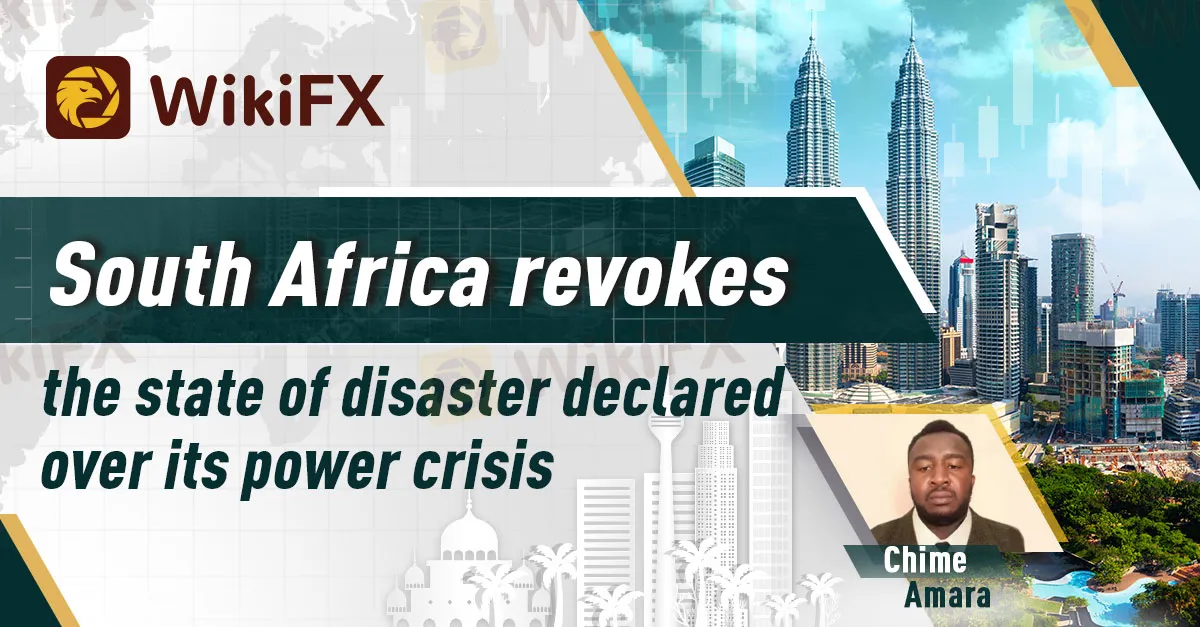简体中文
繁體中文
English
Pусский
日本語
ภาษาไทย
Tiếng Việt
Bahasa Indonesia
Español
हिन्दी
Filippiiniläinen
Français
Deutsch
Português
Türkçe
한국어
العربية
South Africa revokes the state of disaster declared over its power crisis
Abstract:South Africa has revoked the state of disaster that was declared in February to assist in tackling its crippling electricity crisis.

By: Chime Amara

South Africa has revoked the “state of disaster” it declared in February to handle its crippling electricity crisis. The move comes after a civil rights group challenged the status in court, claiming that it would enable corruption. The government has assured that it will continue with the works aimed at reducing the impact of power cuts using the legislation and contingency arrangements, and other emergency measures put in place.
The power crisis has caused daily rolling power cuts by Eskom, with most households and businesses experiencing up to 10 hours without electricity daily.
The decision to revoke the “state of disaster” status was welcomed by many who had concerns about the potential misuse of emergency powers. The civil rights group that challenged the status, OUTA, believes that the crisis can be managed using existing laws and regulations.
However, some stakeholders have expressed disappointment that the withdrawal of the “state of disaster” may slow down efforts to address the power crisis. The telecommunications industry, in particular, had high hopes that the emergency measures would help expedite regulatory relief to address the crisis's effects on the economy.
The power crisis in South Africa no doubt has been ongoing for years, with state-owned utility Eskom struggling to meet the country's electricity demand. The crisis has had a significant impact on the country's economy, with frequent power cuts causing disruptions to businesses and daily life.
The government has stated that it remains committed to finding long-term solutions to the power crisis, including increasing the use of renewable energy sources and reducing reliance on Eskom. However, implementing these solutions will take time and require significant investment, which may not provide an immediate solution to the crisis.
As South Africa moves forward without the “state of disaster” status, many will be watching to see if the government can successfully manage the power crisis using existing legislation and contingency arrangements. The country's ability to do so will be critical to its economic recovery and stability in the years ahead.

Disclaimer:
The views in this article only represent the author's personal views, and do not constitute investment advice on this platform. This platform does not guarantee the accuracy, completeness and timeliness of the information in the article, and will not be liable for any loss caused by the use of or reliance on the information in the article.
Read more

WikiFX Review: Is FxPro Reliable?
Founded in 2006, FxPro is a reputable UK-based broker, trading on various market instruments. In this article, we will help you find the answer to one question: Is FxPro reliable?

Geopolitical Events: What They Are & Their Impact?
You've heard many times that geopolitical events have a significant impact on the Forex market. But do you know what geopolitical events are and how they affect the FX market? Let us learn about it today.

Why Do You Feel Scared During Trade Execution?
Trade execution is a pivotal moment for traders. It is when analysis turns into action, and potential profits or losses become reality. However, for many traders, this moment is accompanied by fear. Why does this happen, and how can you address it?

WikiEXPO Global Expert Interview: Simone Martin—— Exploring Financial Regulation Change
In the midst of financial innovation and regulation, WikiGlobal, the organizer of WikiEXPO, stays abreast of industry trends and conducts a series of insightful and distinctive interviews on pivotal topics. We are delighted to have the privilege of inviting Simone Martin for an in-depth conversation this time.
WikiFX Broker
Latest News
Geopolitical Events: What They Are & Their Impact?
Top 10 Trading Indicators Every Forex Trader Should Know
ASIC Sues Binance Australia Derivatives for Misclassifying Retail Clients
WikiFX Review: Is FxPro Reliable?
Malaysian-Thai Fraud Syndicate Dismantled, Millions in Losses Reported
Trading frauds topped the list of scams in India- Report Reveals
Why Do You Feel Scared During Trade Execution?
WikiFX Review: Something You Need to Know About Markets4you
Revolut Leads UK Neobanks in the Digital Banking Revolution
Fusion Markets: Safe Choice or Scam to Avoid?
Currency Calculator


